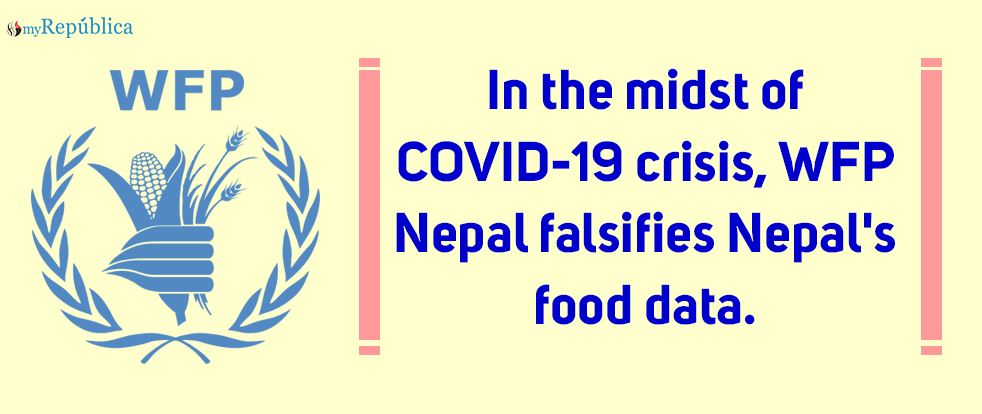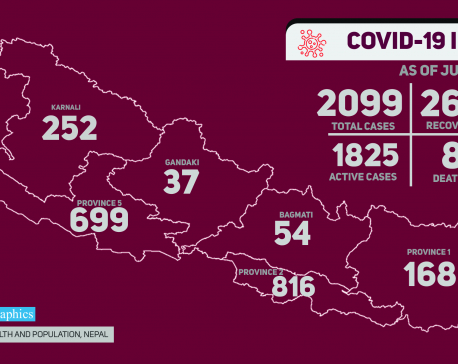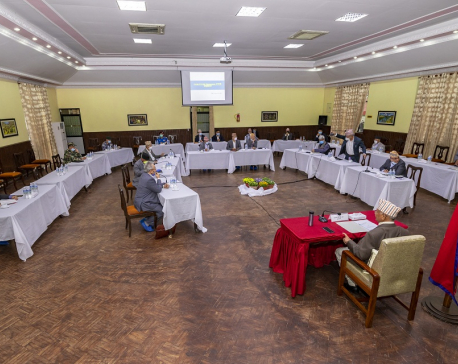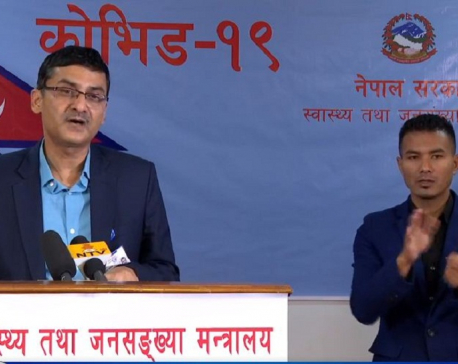
OR
COVID-19, food, false data and WFP
WFP reports on food security exaggerated: Nepal Government
Published On: April 22, 2020 12:10 PM NPT By: SHREE RAM SUBEDI

KATHMANDU, April 22: The World Food Programme (WFP) Nepal office has prepared two reports on food security and vulnerability in the last 15 days. The first one on April 6 and the second on April 16. These reports aimed at tracking Nepal’s food security situation after the COVID-19. However, the UN agency reports have invited criticism and objections from the Ministry of Agriculture and Livestock Development (MoALD), the government authority in computation and dissemination of food security-related data in Nepal.
"The WFP report, especially the first one, is exaggerated in terms of the status of food security, food imports, market prices and the projection of summer crops output," Ram Krishna Regmi, a food security focal point at the ministry said. "Significant reductions in the harvest of wheat and winter crops, and the planting of rice and summer crops could have serious implications for food security in the price and availability issues, leading to widespread food insecurity," the WFP Nepal Office report published on April 6, stated.
"This period marks the start of the wheat harvest, but restrictions on the movement of people, combined with an absence or shortage of daily agricultural wage labor from other regions could impact the final harvest," the WFP report, entitled "Nepal COVID-19: Food Security & Vulnerability Update," said. The report was shared with donors and various government ministries.
However, Regmi, who is also MoALD’s senior statistician, said that the WFP projection was flawed. He argued that the production of wheat, barley, and potato would increase this year.
"Due to good winter rain, it is expected that wheat and barley production will increase by 9 percent this year and potato production by 4 percent in comparison to last year," Regmi said. Arguing that lockdown has made agriculture laborers, which include students, other workforces, migrants from India, more available in rural areas, he said, "WFP report is hardly supported by facts”.
Also, it has been found that the cereal import data of the WFP was also wrong. The UN agency has said that Nepal imported an average of 62,600 metric tons of rice and 49,000 metric tons of maize per month from mid-February to mid-March of the current fiscal year. However, according to the Customs Office data, only 52,000 metric tons of rice and 38,000 metric tons of maize were imported every month on an average during the first seven months of the current fiscal year (FY 2019/2020).
"The WFP data wrongly suggests that a total of 147,000 metric tons of additional rice and maize were imported in the first seven months of the fiscal year," added Regmi. These data were not corrected in the second report published on April 16. The WFP’s first report has claimed that prices of cereals and pulses went up by 20 percent nationally and vegetable prices doubled in several districts across the country. Regmi refuted the claim and argued, "The cereal price fluctuation is following its usual trend and prices of the vegetables are lower than before at Kalimati vegetable market".
The ministry also expressed its concern over the situation of food stocks in few districts in WFP's second report. The second report has said food stocks were enough for three months but were not uniform across the country. "Hard-to-access markets with low food stock levels include Humla, Bajura, Bajhang, but also Lamjung, Gorkha and Dhading districts," it said.
Regmi questioned the inclusion of Lamjung, Gorkha and Dhading in this category. "Food can be delivered within a few hours in these accessible districts and they can not be parallel to the remote districts of Humla, Bajura, and Bajhang."
Dr. Hari Bahadur KC, MoALD spokesperson, informed that the ministry has communicated its objection about the report to the UN agency. "We have communicated our concern to the chief of WFP Nepal office," KC said, adding, "We have requested them to share such reports with the ministry before finalizing them."
The WFP Nepal office has said that the first report was prepared in a very short period, and was based on the preliminary estimate of the food security situation. "We are currently working for an elaborate and comprehensive report about food security," an official at WFP Nepal official said.
However, this is not the first time that the UN agency has courted controversy in Nepal. In 2015, the WFP was forced to dump 14 metric tons of rotten rice that were supplied to the earthquake victims in Gorkha. After denying supplying rotten and inedible rice, the UN agency was forced to dig a hole and dump the rice. The office initially defended by saying that it was “natural for some sacs to get rotten while supplying a large amount of rice”.
You May Like This

Number of COVID-19 cases in Nepal crosses 2000 mark
KATHMANDU, June 2: The number of COVID-19 cases in Nepal crossed 2000 mark on Tuesday with the highest addition on... Read More...

High-level committee recommends to govt to extend lockdown, Cabinet to take final decision
KATHMANDU, May 5: The high-level government committee formed to prevent and contain the novel coronavirus disease (COVID-19) has recommended to... Read More...

COVID-19 cases climb to 32 in Nepal as one more person tested positive for coronavirus today (with video)
KATHMAND, April 21: One more COVID-19 case has been confirmed on Tuesday taking the number of total coronavirus infected patients... Read More...






Just In
- Challenges Confronting the New Coalition
- NRB introduces cautiously flexible measures to address ongoing slowdown in various economic sectors
- Forced Covid-19 cremations: is it too late for redemption?
- NRB to provide collateral-free loans to foreign employment seekers
- NEB to publish Grade 12 results next week
- Body handover begins; Relatives remain dissatisfied with insurance, compensation amount
- NC defers its plan to join Koshi govt
- NRB to review microfinance loan interest rate











Leave A Comment